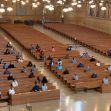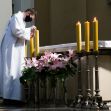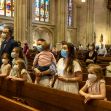For the fifth time since the onset of the COVID-19 pandemic, the United States Supreme Court has placed religious liberty over California’s right to prioritize public health and safety. In a narrow 5-4 decision, the court rejected the Ninth Circuit’s analysis of California’s regulations that limited in-home worship to three households. It held that California failed to meet the Constitutional requirements of the First Amendment’s Free Exercise clause and issued an emergency injunction against the state’s order.
In a Per Curiam or unsigned opinion issued April 9 in Ritesh Tandon v. Gavin Newsom, Governor of California, the Court found four shortcomings in California’s pandemic regulations that sought to limit activities such as prayer meetings and bible study if they involved too many worshipers. The decision came after a Santa Clara County pastor challenged Governor Newsom’s restrictions that would prevent him from bringing members of his church to his home for religious services or study.
The court’s first issue was with the neutrality of the regulation. They said it “triggered strict scrutiny” under the Free Exercise Clause which states, “Congress shall make no law respecting an establishment of religion, or prohibiting the free exercise thereof…” Any law is therefore subject to strict scrutiny whenever a comparable secular activity is treated more favorably. The Court’s opinion stated that California failed to meet this test because it treated several secular activities, including hair salons, retail stores, and movie theaters more favorably than in-home worship by more than three households at a time.
Second, the court’s opinion said that California failed to satisfactorily prove that in-home worship contributed more to the spread of COVID-19 than comparable activities. The justices criticized the Ninth Circuit’s citing of precedents that found homes comparable to private rather than public buildings. They are not the same.
The Court’s third point was a problem with the Ninth Circuit’s failure to explain why California could not safely permit at-home worship to use the same precautions it allows for secular activities. The state’s contention that such safeguards might not “translate readily” to homes needed further clarification.
The court’s final point disagreed that the state’s regulations were moot because they were changed shortly after the application for injunctive relief was filed. Instead, the court stated that California had a “track record of moving the goalposts” and concluded that applicants are entitled to injunctive relief, as long as they “remain under a constant threat that government officials will use their power to reinstate the challenged restrictions.”
The Per Curiam opinion included Justices Clarence Thomas, Samuel A. Alito Jr., Neil M. Gorsuch, Brett M. Kavanaugh and Amy Coney Barrett.
Dissenting Justices Kagan, Breyer and Sotomayor explained that California complies with the First Amendment because it limits both religious and secular gatherings in homes to three households. “It has adopted a blanket restriction on at-home gatherings of all kinds, religious and secular alike,” the dissent stated. Chief Justice John G. Roberts Jr. said he would not have granted the emergency order.
Justice Kagan’s respectful but strong dissent stated the court, “once more commands California to ignore its experts’ scientific findings,” thus impairing “the State’s effort to address a public health emergency.” Her comments align with those of California’s lawyers who argued that “California’s policy is entirely neutral toward religion; it applies to gatherings for any purpose — secular or religious.”
Last week’s decision poured fuel on the already blazing controversy over a state’s rights to limit religious worship during a pandemic. Last February, the court said California churches may open for indoor worship if they set limits on the number of worshipers.
Both sides took to the media to espouse their views on the court’s latest decision. Writing in New York Magazine, Chas Danner said, “the ruling is yet another move by the conservative-dominated Court to place religious practice above the concerns of public-health officials since Justice Amy Coney Barrett replaced Ruth Bader Ginsburg.”
Robert Dunn, lawyer for petitioners Pastor Jeremy Wong and Karen Busch, writing in a Los Angeles Times op-ed, took the other side, saying, “The court’s decision in Tandon sends a clear and important message to state and local governments that they cannot trample religious liberty while exempting their political allies and favored industries – such as Hollywood and big-box retailers—many of which lobbied hard for special treatment.” He also said the state’s restrictions “strike at the heart of Christian practice.”






